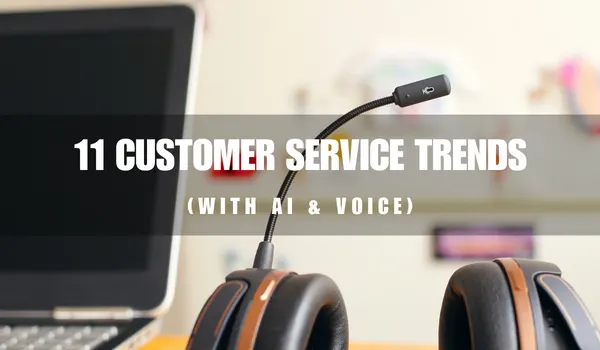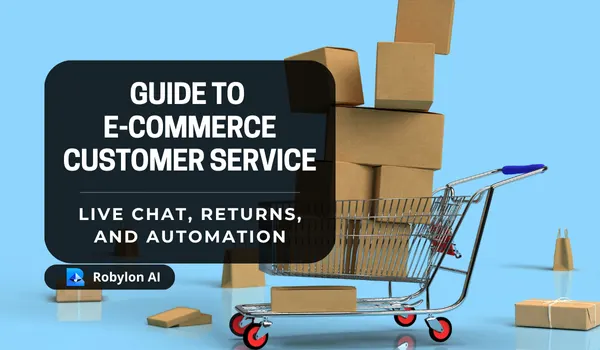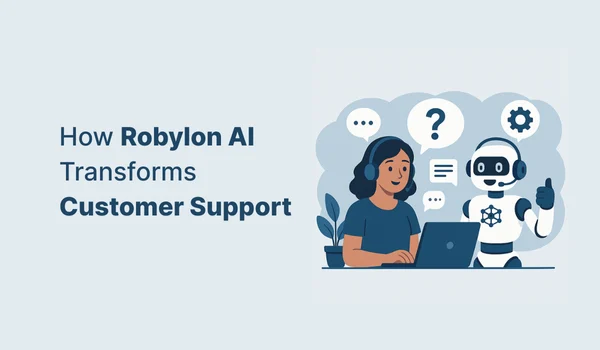TL;DR
- Free help desk tools in 2026 offer surprisingly robust features: ticketing, automation, knowledge bases, and integrations.
- This guide compares top platforms like Robylon AI, Zoho Desk, and Freshdesk.
- Find out which tools work best for startups, IT support, and customer service teams.
- Learn the tradeoffs between free SaaS and open-source tools.
- Know when it’s time to upgrade for advanced analytics, user limits, or omnichannel support
Introduction
If your customer support still lives in Gmail threads, sticky notes, or Slack chaos, it’s officially time for an upgrade. In 2026, even the free help desk software scene has leveled up offering robust ticketing, automation, integrations, and reporting features once reserved for premium tools. And let’s be real: not every business has the budget for a high-end SaaS stack.
According to recent market trends, more than 40% of Small and Midsize Businesses now rely on free or freemium support tools to streamline ticket management and improve resolution times. With tighter budgets and growing expectations for faster, smarter customer service, the demand for cost-effective solutions is only going up.
We have curated a list of the best free help desk software options in 2026 from open-source platforms for IT support to cloud-based SaaS tools for small businesses. Each pick includes use case highlights, limitations, and what kind of teams they are best for.
Schedule a walkthrough with our team, book a demo
What to Look for in Help Desk Software?
To deliver efficient, scalable support without breaking the bank, here are the key features to prioritize when evaluating free help desk tools in 2026.
1. Robust Ticketing System
The best free help desk software should let you
- Convert emails, chats, or form submissions into tickets
- Assign them to team members
- Prioritize based on urgency or service level agreement
- Track progress from open to resolution
Smart routing, ticket categorization, and collision detection (to avoid double replies) are nice-to-have even in free plans.
2. Built-In Knowledge Base
Look for help desk software with a built-in or public knowledge base where customers can search FAQs, how-tos, and troubleshooting tips.
Why it matters
- Reduces ticket volume
- Empowers customers to help themselves
- Helps internal agents find quick answers
Additional points if it supports rich content like videos or product guides. Start here: the 2026 AI knowledge base guide.
3. Automation & SLA Tracking
Free doesn’t have to mean manual. Many top-tier freemium platforms now include
- Auto-routing and assignment rules
- Auto-tagging and workflow triggers
- Service level agreement timers to track first response and resolution deadlines
These features ensure nothing slips through the cracks, especially when your team is juggling a high volume of tickets.
4. Multi-Channel Support
A solid help desk platform should meet your customers wherever they are; email, web, social, or live chat.
Check for
- Unified inboxes that combine tickets across channels
- Live chat widgets
- Native integrations with your CRM or communication tools like Slack, Teams, or Gmail
This kind of connectivity keeps your support seamless, even if your team is small.
5. Collaboration Tools
When more than one agent works on a ticket, you need features that reduce friction
- Internal notes
- @mentions and tagging
- Activity logs or collision alerts
These features are crucial for maintaining transparency and avoiding mixed messages.
6. Reporting & Analytics
Data is how you level up your support game. Look for help desk software with at least basic reporting capabilities, such as
- Ticket volume trends
- Agent performance
- Service level agreement breaches
- Knowledge base usage
Advanced dashboards may be locked behind paid plans, but basic analytics can still uncover blind spots in your support process.
7. User & Ticket Limits
Before choosing a tool, always check the limits
- How many agents/users can you onboard?
- Are there caps on monthly tickets or email volume?
- Which features are limited to trials or freemium forever?
For example, Zoho Desk supports up to 3 agents with automation and a knowledge base even on its free plan, while Freshdesk offers collaboration features like internal notes and activity tracking.
Top 9 free help desk software
Enlisted are key tools which can be used based on their free/freemium models as per your suitability.
1. Robylon
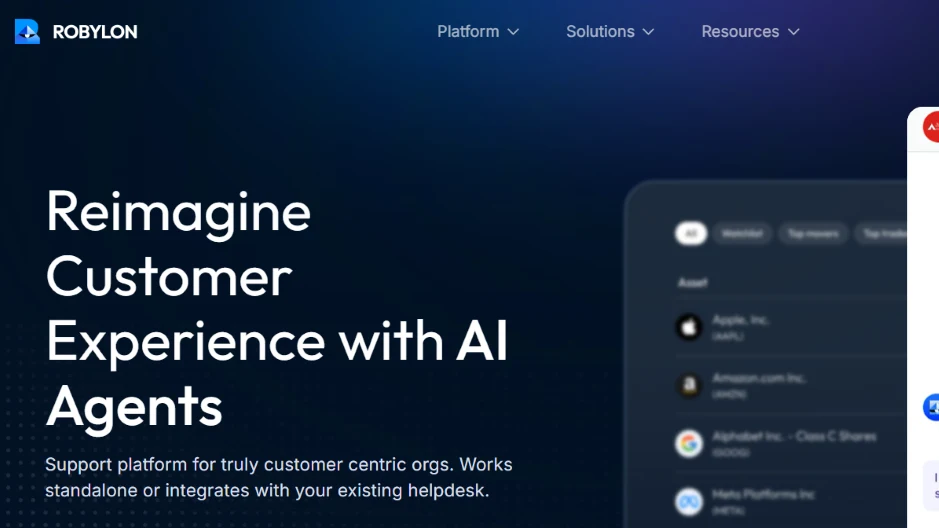
Robylon is a next-gen AI-powered help desk and chatbot solution for startups and modern businesses. Great for automating conversations and resolving tickets in real-time.
Best for: Fast-growing teams ready to automate with AI
Users: Startups, tech companies, e-commerce, gaming, logistics
Pricing & Free Trial
- Free basic chatbot plan
- Starts at $39/month, usage-based or per-resolution pricing
- Advanced AI help desk: Custom pricing - Free trial available
Top Features
- AI ticket routing
- CRM and internal tool sync
- Real-time conversation handling
Pros
- AI-powered ticket deflection and resolution
- Smooth CRM and internal tool integrations
Cons
- Still maturing in analytics reporting
- Not suitable for teams with zero AI experience
2. Zendesk
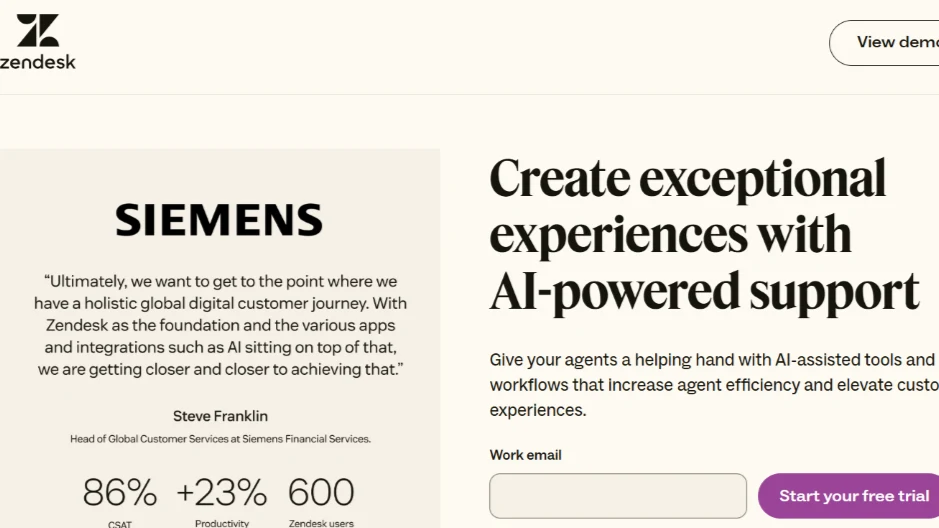
Zendesk is a widely used customer support platform across the globe. It’s best for companies that want a scalable support solution with advanced analytics.
Best for: Scalable customer support across channels
Users: Enterprises, startups, e-commerce
Pricing
- Support Team: $19 per agent/month
- Suite Team: $55 per agent/month
- Suite Professional: $115 per agent/month
- Enterprise: Custom pricing
Free 30-day trial
Top Features
- AI tools for support
- Workflow automations
- Omnichannel ticketing
Pros
- Feature-rich and scalable
- Strong reporting and AI capabilities
Cons
- Pricey for small businesses
- Learning curve for admins
3. Freshdesk
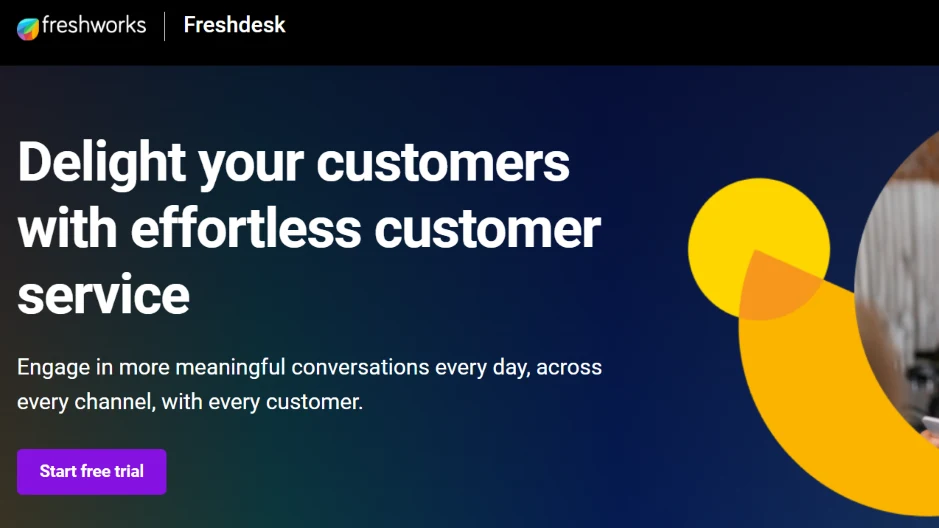
Freshdesk by Freshworks is a popular cloud-based help desk platform that offers a solid free tier for small teams. With built-in ticketing, automation, and multi-channel support, it’s a go-to for businesses that want a user-friendly solution without the upfront cost.
Best for: Small to mid-sized teams looking for a no-fuss support solution
Users: SMBs, startups, IT teams, educational institutions
Pricing & Free Trial
- Free: Up to 10 agents
- Growth: $ 999/agent/month
- Pro: $ 3599/agent/month
- Enterprise: $5699/agent/month
- Free 21-day trial available
Top Features
- Email ticketing and knowledge base
- Team collaboration tools
- Automation and SLA management
- Omnichannel support (email, chat, phone, and social)
Pros
- Free plan supports up to 10 agents
- Built-in knowledge base and automation, even in lower tiers
Cons
- Some features locked behind higher-tier plans
- Limited customization options in the free version
4. Zoho Desk
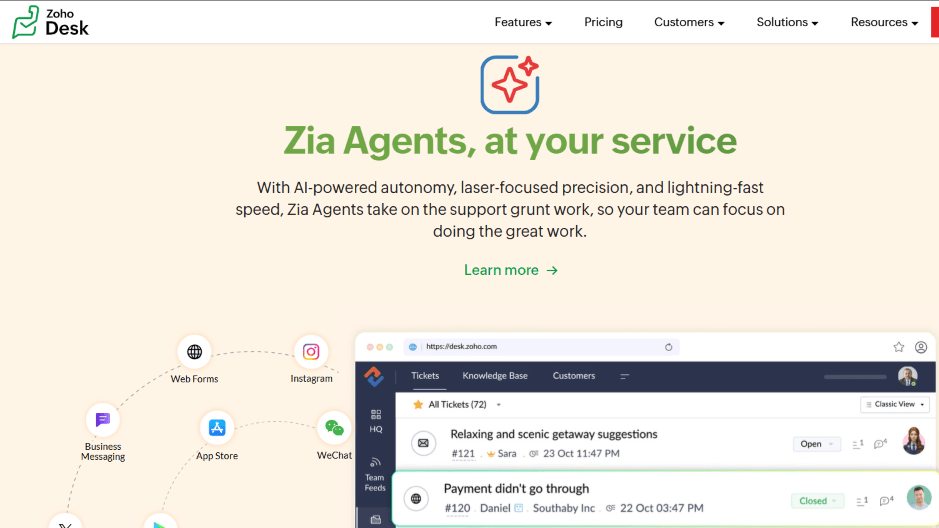
Zoho Desk is part of the Zoho ecosystem, offering affordable and scalable support solutions. Best for startups and small businesses looking for CRM integration.
Best for: Budget-conscious teams that need CRM-connected support
Users: Startups, SMBs, remote teams, customer support centers
Pricing & Free Trial
- Free - 15-day trial up to 3 agents
- Express: $7/agent/month
- Standard: $14/agent/month
- Professional: $23/agent/month
- Enterprise: $40/agent/month
Top Features
- Customizable workflows
- Help center builder
- CRM integration
Pros
- Highly customizable workflows
- Affordable entry-level plans
Cons
- UI can feel outdated
- Limited analytics in lower-tier plans
5. Intercom
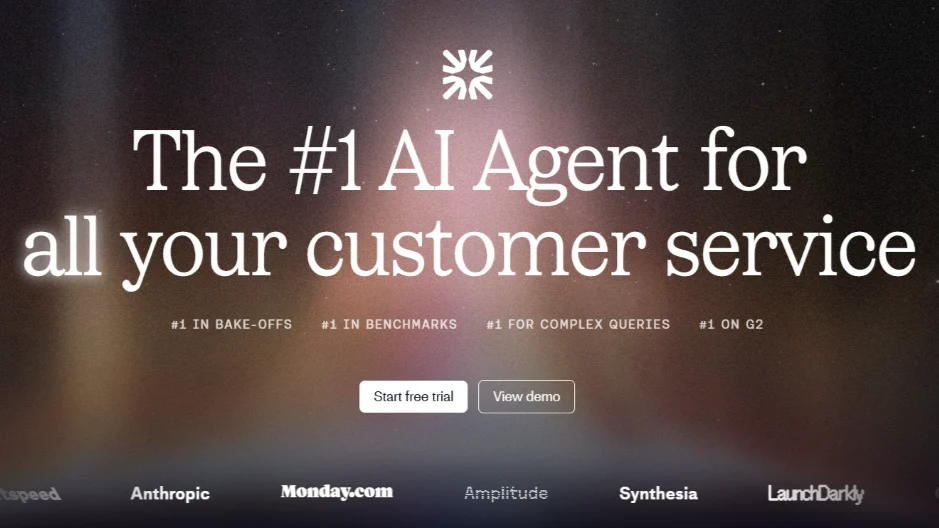
With built-in AI, Intercom enables real-time interactions between businesses and customers. It helps teams engage users through live chat, email, and automation tools.
Best for: Businesses focused on proactive customer engagement
Users: SaaS startups, mid-market, customer success teams
Pricing:
- Essential: $29/seat/month
- Advanced: $85/seat/month
- Expert: $132/seat/month
Free 14-day trial
Top Features
- AI agent for support automation
- Real-time messaging and shared inbox
- Ticket routing workflows
- Behavioral triggers and product tours
- In-app messages and surveys
Pros
- Strong engagement tools with AI support
- Highly customizable for user workflows
Cons
- Can be costly for growing teams
- Advanced features require training and higher-tier plans
6. HubSpot Service Hub
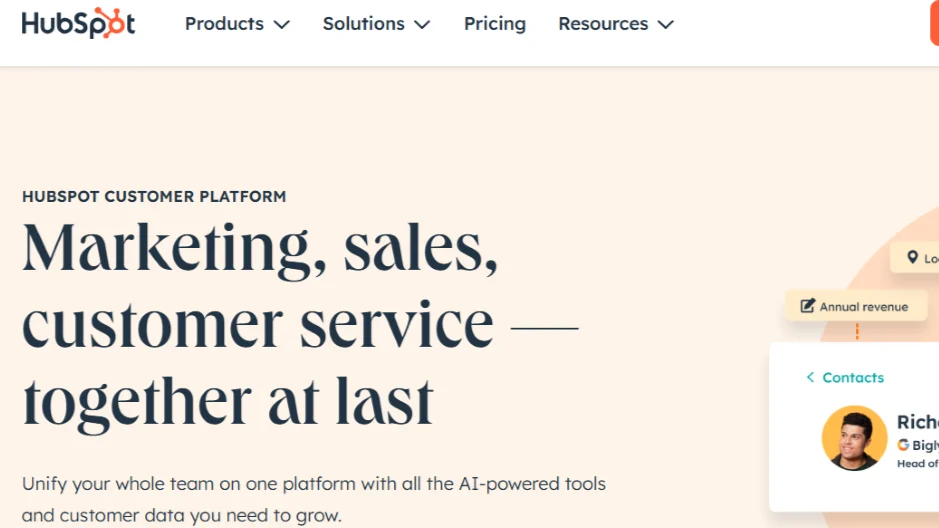
HubSpot Service Hub is part of HubSpot's CRM suite, providing a centralized platform for managing customer support across channels. It combines ticketing, automation, and live chat to streamline service operations.
Best for: Small teams and startups using CRM-backed support
Users: SaaS companies, marketing agencies, growing SMBs
Pricing
- Free Tool: $0
- Starter: $20/seat/month (billed annually)
- Professional: $90/seat/month (billed annually)
- Enterprise: $150/user/month (billed annually)
Top Features
- Shared inbox and live chat
- AI-powered ticket routing
- Customer portal and knowledge base
- Reporting dashboard
Pros
- Seamless CRM connection for contextual support
- User-friendly interface with essential tools included in the free plan
Cons
- Can become expensive with team expansion
- Onboarding and setup can be difficult for non-HubSpot users
7. Salesforce Service Cloud
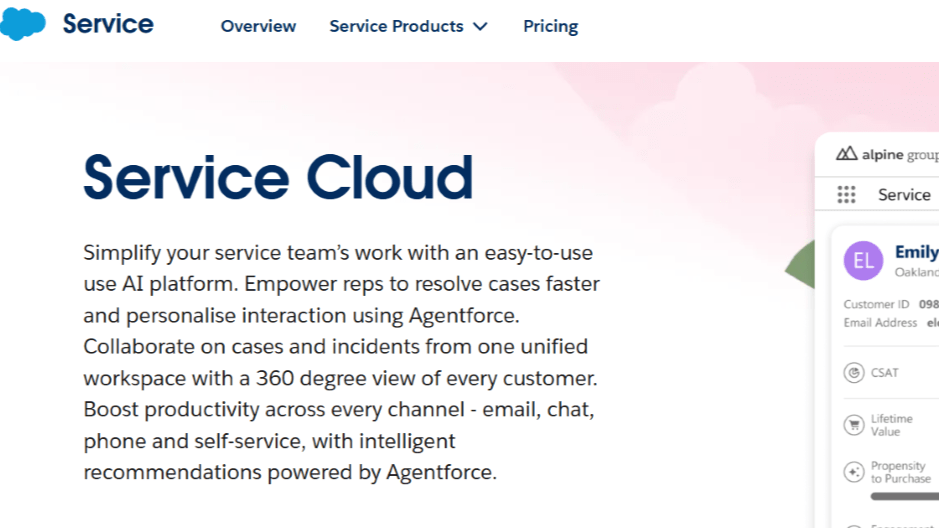
Salesforce Service Cloud is an enterprise-grade support platform integrated with the broader Salesforce ecosystem. It focuses on automation, scalability, and omnichannel customer service.
Best for: Large enterprises with complex service needs
Users: Enterprise IT, retail, finance, customer service teams
Pricing
- Starter: $25/user/month
- Professional: $80/user/month
- Enterprise: $165/user/month
- Unlimited: $330/user/month
Free 30-day trial
Top Features
- AI and automation tools
- Workflow and approval processes
- SLA tracking and reporting
- Multi-channel ticket management
- Service analytics dashboard
Pros
- Powerful automation and reporting tools
- Rich Salesforce ecosystem integration
Cons
- Expensive and complex for smaller teams
- Requires integrating multiple Salesforce tools for full functionality
8. HelpDesk
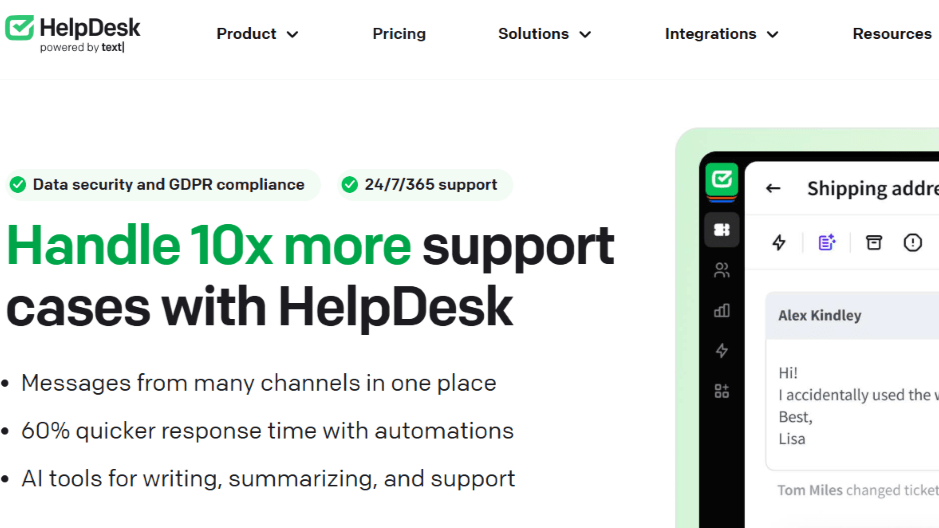
HelpDesk is a robust support ticketing platform designed to simplify issue tracking and improve customer engagement. It offers a modern ticketing system tailored for fast issue resolution and team collaboration, built for businesses that prioritize speed and usability in customer support.
Best for: Small to mid-sized teams managing multiple support requests
Users: SMBs, SaaS, agencies
Pricing
- Team: $29 per agent/month (billed annually)
- Business: $50 per agent/month (billed annually)
- Enterprise: Custom pricing (contact sales)
Free 14-day trial
Top Features
- Canned responses
- Collaboration tools
Pros
- Clean, intuitive interface
- Automated ticket workflows
Cons
- Limited reporting tools
- Fewer third-party integrations
9. HappyFox Help Desk
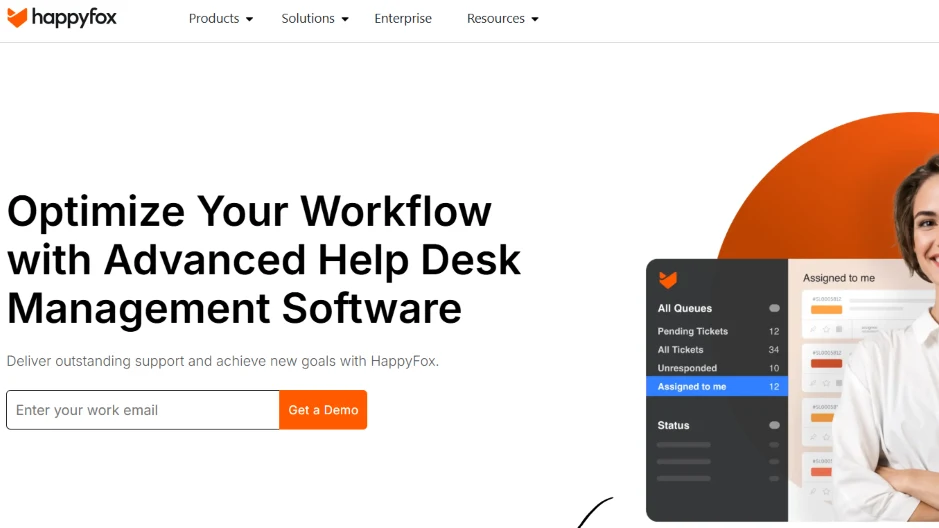
HappyFox offers a clutter-free, easy-to-use help desk platform. It’s great for support teams that need multi-channel communication and automation.
Best for: Teams that prioritize clean design and usability
Users: E-commerce, SaaS, customer support teams
Pricing
- Basic: $21 per agent/month
- Team: $39 per agent/month
- Pro: $89 per agent/month
- Enterprise PRO: Custom pricing
Free 14-day trial
Top Features
- Multi-channel ticket support
- SLA management
- Canned actions
Pros
- Clean, user-friendly interface
- Omnichannel support
Cons
- Limited third-party integrations
Open-Source vs. Closed-Source (Free & Paid) Help Desk Tools
When evaluating help desk software, you are not just choosing between brands you choose between three core categories
- Open-Source Help Desk Tools
- Free Closed-Source Help Desk Software
- Paid Closed-Source Solutions
Each option serves a different type of business, and your choice should align with your team's technical skill, growth goals, and how much control you want over customization and data.
1. Open-Source Help Desk Software
Best for: Development teams, IT departments, or businesses with unique workflows.
Pros
- Fully customizable with access to source code.
- No licensing fees, free to use indefinitely.
- Complete control over hosting, security, and data policies.
Cons
- Requires technical expertise to deploy and manage.
- Maintenance, updates, and bug fixes fall on your team.
- Limited official support unless using a managed version or hiring devs.
osTicket, Zammad, and Faveo Helpdesk are among the widely used open-source platforms.
2. Free SaaS Help Desk Tools (Freemium)
Best for: Startups, small teams, and non-technical users.
Pros
- Quick setup, no coding required.
- Maintenance, security, and backups handled by the provider.
- Many include built-in support and onboarding.
Cons
- Feature limitations (user caps, limited workflows, fewer integrations).
- With less customization you are tied to the platform’s roadmap.
- Data is stored in third-party cloud infrastructure.
Free closed-source help desk software includes tools like Robylon, FreshDesk, Zoho Desk and HubSpot Service Hub.
3. Paid Closed-Source Help Desk Platforms
Best for: Scaling companies that need advanced features, integrations, and reliable support.
Pros
- Rich feature sets with automation, reporting, and omnichannel support.
- Premium onboarding, customer success, and technical support.
- Ideal for fast-growing teams that need plug-and-play efficiency.
Cons
- Higher cost, especially as your agent count grows.
- Limited customization compared to open-source platforms.
- You don’t control the codebase or infrastructure.
Tools like ZenDesk, Intercom, Salesforce Service Cloud, HappyFox and HelpDesk offer paid software solutions while Robylon, FreshDesk, Zoho Desk and HubSpot Service Hub offer paid premium plans as well.
Bottom Line
- Go open-source if you want control, flexibility, and have the dev muscle.
- Choose a free SaaS tool if you need something quick, simple, and budget-friendly.
- Invest in paid closed-source if your support operation is scaling fast and you need reliability and advanced functionality out of the box.
Best Free Help Desk Tools by Use Case
1. Startups & Small Teams
Best Picks: Zoho Desk, HubSpot
- Budget-friendly, easy to set up, and scale with team growth
- Zoho Desk offers deep CRM integration
- Live chat, ticketing, and a shared inbox are included in HubSpot’s free plan.
2. IT Support & Internal Help Desks
Best Picks: Freshdesk, HelpDesk
- Freshdesk supports internal SLAs, ticketing, and agent collaboration at no cost for up to 10 agents
- HelpDesk offers an intuitive UI and canned responses that fit internal IT request workflows
- Great for managing internal tickets, device issues, and staff requests
3. Customer Service & Support Teams
Best Picks: Robylon, HappyFox
- Robylon delivers AI tools, automation, and omnichannel support for growing support teams
- HappyFox simplifies multi-channel ticket handling in a clean, user-friendly interface
- Ideal for teams focused on fast customer resolution and omnichannel coverage
4. AI & Automation-First Workflows
Best Picks: Robylon, Intercom
- Robylon AI enables real-time AI support, smart routing, and CRM sync for modern support teams
- Intercom’s platform combines AI chat, automation, and behavior-based triggers to drive smarter customer engagement.
- Great for companies scaling without increasing headcount
Check out practical use cases that show AI in action across industries: Proven AI Chatbot Use Cases for Business in 2026
Help Desk Software Selection Criteria
We grounded a framework in common buyer needs like faster response times and better ticket organization plus a structured scoring system to ensure fairness:
1. Core Functionality
Each tool had to support critical use‑cases
- Ticket handling and incident tracking
- Email-based support
- Reporting & analytics
- Multi‑channel communication
2. Standout Features
To separate the great from the average, looked for
- AI‑powered ticket prioritization
- Self‑service portals
- Advanced workflow automation
- Unified omnichannel support
- Robust knowledge-base management
3. Usability
Ease matters so, evaluated
- Intuitive, easy-to-navigate interface
- Fast ticket creation
- Minimal learning curve
- Quick access to key features
4. Onboarding
A smooth setup reduces friction
- Structured training materials
- Step-by-step guides
- Interactive walkthroughs
- Product tours, webinars, tutorials
5. Customer Support
Prompt, reliable help counts
- Fast responses
- Multiple support channels
- Quality documentation
- Live agent access
- Community forums
6. Value for Money
Balancing cost and benefit
- Transparent pricing
- Competitive per‑agent cost
- Robust feature sets
- Scalable plans
- Free or trial-tier availability
When Should You Switch to a Paid Tool?
Free help desk tools are great for getting started, but they eventually hit their ceiling. Consider upgrading to a paid plan when
- Your team grows beyond user or agent limits.
Most free plans cap users, which can block scaling efforts. - You need deeper automation or integrations.
If ticket routing, CRM sync, or SLA tracking feels limited, it’s time to go pro. - Reporting is not cutting it.
Basic analytics won’t support data-driven decisions at scale. - You are managing multiple brands or channels.
Free tools often lack advanced omnichannel or multi-brand support. - You require more security or compliance.
If you are handling sensitive data, advanced role-based access and compliance features in paid versions are non-negotiable. - Your support experience must reflect your brand.
White-labeling, branded portals, and custom domains usually unlock only with paid plans. - You have outgrown email-first workflows.
When customers expect chat, social, and mobile support, free tools often can't keep up.
If your support team is spending more time working around the software than using it efficiently, a paid upgrade could return that time as real value.
Help Desk Tools at a Glance
Automate Customer Response with Robylon
Helpdesk automation with Robylon is a low-risk, high-impact way to streamline your support operations. With AI-powered query resolution, omnichannel support, and detailed analytics, Robylon helps lean teams work smarter, respond faster, and reduce dependency on manual agents.
Robylon AI stands out by offering an out-of-the-box automation platform that handles 80–90% of routine queries across chat, email, tickets, and voice without any coding. It integrates with your existing tools, learns from past queries, and launches in just 7 days, giving your team the speed, scale, and reliability it needs.
Book a demo today and see how Robylon can modernize your support stack.
Conclusion
Free help desk software in 2026 is no longer just a “trial version.” With tools like Robylon, Zoho Desk, Freshdesk, and HubSpot, teams can now access AI support, automation; access CRM features and multichannel ticketing without any initial investment.
But free is not forever. As your support needs scale, so should your tools. If you are hitting user limits, struggling with analytics, or managing complex workflows across channels, consider upgrading to paid options for enterprise-grade performance.
Each platform has its strengths, so the best choice depends on your team size, support volume, and how fast you are scaling. Start free, test what works, and upgrade when your support experience demands more power, automation, or integrations.
FAQs
When should I switch to a paid plan?
If you are hitting agent limits, need better reporting, or want multi-brand/omnichannel support, it's time to consider upgrading.
Can HelpDesk or HappyFox be used for internal IT support?
When it comes to internal help desk tasks, HelpDesk offers a lightweight and efficient solution. HappyFox supports several communication channels, but most of its standout features are reserved for paid users.
What’s the difference between Zendesk and Salesforce Service Cloud?
Both are enterprise-ready, but Zendesk is more user-friendly and fast to deploy, while Salesforce Service Cloud provides deeper custom workflows, powerful analytics, and broader integration with the Salesforce ecosystem.
What are the main limitations of Freshdesk’s 14-day free tier?
Freshdesk's 14-day free plan allows up to 10 agents which includes email ticketing and collaboration tools. However, advanced analytics and automation rules are gated behind paid tiers.
Can Robylon AI handle full ticket automation on the free plan?
Robylon offers a Free chatbot with 250 message credits/month (~60 chats) for free with its AI help desk. Full ticket deflection, CRM sync, and real-time automation come with the advanced plan.
What are the best no-cost help desk solutions for startups?
With quick setup, ticketing, and automation capabilities, Zoho Desk and HubSpot Service Hub are well-suited for growing startup teams.





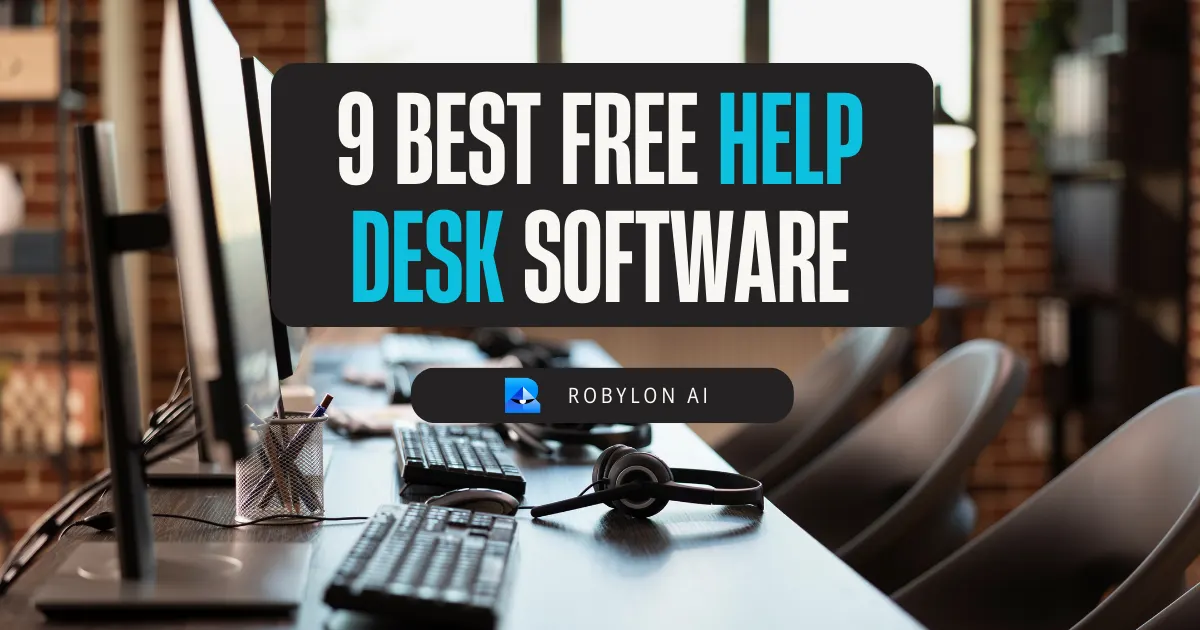

.png)
